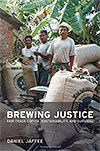
Feeding our ethics: A conversation about food and values with Samantha Noll
A simple decision about what to order for lunch can have profound effects on others.
“Food is interesting because it touches so many other communities,” says Samantha Noll, an associate professor of bioethics in the School of Politics, Philosophy, and Public Affairs at Washington State University. “When we decide that we’re going to eat that falafel sandwich, or that burger, or that salad, we’re impacting others with that seemingly simple choice.”
 Samantha Noll
Samantha Noll
(Courtesy WSU School of Politics, … » More …






